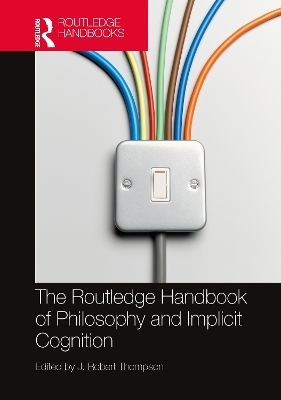
The Routledge Handbook of Philosophy and Implicit Cognition
Routledge (Verlag)
978-0-367-85718-9 (ISBN)
Humans think of ourselves as acting according to reasons that we can typically articulate and acknowledge, though we may be reluctant to do so. Yet some of our actions do not fit this mold—they seem to arise from motives and thoughts that appear outside of our control and our self-awareness. Rather than treating such cases as outliers, theorists now treat significant parts of the mind as operating implicitly or ‘behind the scenes’. Mental faculties like reasoning, language, and memory seem to involve this sort of implicit cognition, and many of the structures we use to understand one another seem infused with biases, perceptions, and stereotypes that have implicit features.
The Routledge Handbook of Philosophy and Implicit Cognition is an outstanding guide and reference source to this important topic. Composed of more than thirty chapters by an international team of contributors, the Handbook is divided into eight clear parts:
Defining Features? Identifying Implicitness Among Cognate Notions
The Nature and Limits of Implicit Processing
Ways of Perceiving, Knowing, Believing
Language
Agency and Control
Social Cognition
Memory
Learning and Reasoning.
The Routledge Handbook of Philosophy and Implicit Cognition is essential reading for students and researchers in philosophy of psychology, moral psychology, and philosophy of mind, and will also be of interest to those in related disciplines such as psychology, neuroscience, and linguistics.
J. Robert Thompson is Associate Professor of Philosophy at Mississippi State University, USA. He studies implicit phenomena as they arise within the fields of developmental psychology, psycholinguistics, and the philosophy of language.
Introduction: In Search of the Implicit J. Robert Thompson Part 1: Defining Features? Identifying implicitness among cognate notions 1. Implicit Mental Representation William Ramsey 2. Measuring and Modeling Implicit Cognition Samuel A.W. Klein and Jeffrey W. Sherman 3. Implicit Cognition and Unconscious Mentality Tim Crane and J. Robert Thompson 4. Implicit Cognition in Relation to the Conceptual/Nonconceptual Distinction José Luis Bermúdez and Arnon Cahen 5. The Fragmented Mind: Personal and Subpersonal Approaches to Implicit Mental States Zoe Drayson 6. The Levels Metaphor and the Implicit/Explicit Distinction Judith Carlisle Part 2: The Nature and Limits of Implicit Processing 7. Implicit Cognition, Dual Process Theory, and Moral Judgment Charlie Blunden, Paul Rehren and Hanno Sauer 8. Implicit Bias and Processing Ema Sullivan-Bissett 9. Predictive Processing, Implicit and Explicit Paweł Gładziejewski 10. Cognitive Penetration and Implicit Cognition Lucas Battich and Ophelia Deroy Part 3: Ways of Perceiving, Knowing, Believing 11. Helmholtz on Unconscious Inference in Experience Lydia Patton 12. Husserl on Habit, Horizons, and Background Dermot Moran 13. Polanyi and Tacit Knowledge Stephen Turner 14. Tacit Knowledge Tim Thornton 15. Collective and Distributed Knowledge: Studies of Expertise and Experience Harry Collins 16. Implicit Beliefs Joseph Bendaña 17. Implicit Self-knowledge Kristina Musholt Part 4: Language 18. Chomsky, Cognizing, and Tacit Knowledge John Collins 19. Language Processing: Making it implicit? David Pereplyotchik 20. Implicit Knowledge in Pragmatic Inference Chris Cummins and Albertyna Paciorek Part 5: Agency and Control 21. Implicit Mechanisms in Action and in the Experience of Agency Sofia Bonicalzi 22. Implicit Cognition and Addiction: Selected Recent Findings and Theory Reinout W. Wiers and Alan W. Stacy 23. Phenomenology, Psychopathology, and Pre-Reflective Experience Anthony Vincent Fernandez Part 6: Social Cognition 24. Race and the Implicit Aspects of Embodied Social Interaction Jasper St. Bernard and Shaun Gallagher 25. Implicit Social Cognition Shannon Spaulding 26. The Development of Implicit Theory of Mind Hannes Rakoczy Part 7: Memory 27. Implicit Memory Sarah K. Robins 28. Memory During Failures of Recall: Information that is Forgotten is not Gone Anne M. Cleary Part 8: Learning and Reasoning 29. Implicit Reasoning Uljana Feest and Thomas Sturm 30. Implicit Knowledge of (parts of) Logic, and how to make it Explicit Keith Stenning and Michiel van Lambalgen 31. What is it like to Learn Implicitly? Arnaud Destrebecqz. Index
| Erscheinungsdatum | 06.08.2022 |
|---|---|
| Reihe/Serie | Routledge Handbooks in Philosophy |
| Zusatzinfo | 3 Tables, black and white; 6 Line drawings, black and white; 6 Illustrations, black and white |
| Verlagsort | London |
| Sprache | englisch |
| Maße | 174 x 246 mm |
| Gewicht | 1140 g |
| Themenwelt | Geisteswissenschaften ► Philosophie ► Sprachphilosophie |
| Geisteswissenschaften ► Psychologie ► Allgemeine Psychologie | |
| ISBN-10 | 0-367-85718-9 / 0367857189 |
| ISBN-13 | 978-0-367-85718-9 / 9780367857189 |
| Zustand | Neuware |
| Informationen gemäß Produktsicherheitsverordnung (GPSR) | |
| Haben Sie eine Frage zum Produkt? |
aus dem Bereich


